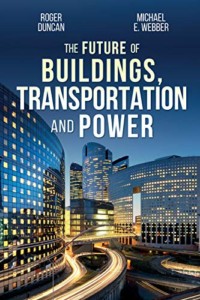Title: The Future of Buildings, Transportation and Power
Authors: Roger Duncan, Michael E Webber
Publisher: Roger Duncan Consulting
ISBN: 978-1734429008
Genre: Non-Fiction
Pages: 290
Reviewed by: Aaron Washington
Pacific Book Review
The Future of Buildings, Transportation, and Power examines the future in regard to transportation, buildings, and other forms of infrastructure. Authors Roger Duncan and Michael E. Webber having worked in the energy and related sectors for years, understand how important energy and infrastructure are for the economy. The authors divided the book into 5 parts, each dealing with a variety of related topics.
The first part of the book talks about the energy efficiency megatrend. I learned much from this chapter as the authors started with the basics before going deep with the discussions on energy, technology, and how they affected building and transportation. I enjoyed reading about historical articulation. The authors give the readers some fascinating background on influential figures in future energy and technology trends, explains each of their theories, and how their foresight came to pass.
Every chapter in Roger Duncan’s and Michael E Webber’s book has something informative. Part 2 was one of my favorite parts of the book. This section of the book has three chapters which talk about building trends, sustainable building, and sentient-appearing buildings. Readers will learn many aspects about constructing the right buildings, the history of constructions, the dynamics of construction, and how major cities form their systems. I found part two to be particularly important because the discussions in the three topics affect everyone; whether directly or indirectly. Roger Duncan and Michael E Webber speak to everyone who is concerned about where they live and how they live.
The tone the authors used in the book is friendly. Even when talking in technical terms, the authors tried to explain in layman vernacular so all readers could get the root concepts in the discussion. The Future of Buildings, Transportation and Power is a great read if you want to learn about energy, buildings, and how man can change his habits to protect the environment. After reading this book, you will realize many cities were built without consideration of how the environment – or even the climate – would be affected in the future. With the knowledge in the book, readers will start being conscious of how they live and use natural resources. No one knows what the future holds but by living right, we can prepare ourselves for the unexpected. Nature can be cruel to those that are not mindful of how they live.
The Future of Buildings, Transportation and Power is recommended for all who are interested in energy, transportation, and building trends. The information in the book is from the authors’ experiences and data from agencies like the International Energy Agency and the Energy Information Administration. I applaud the authors for the extensive research they did and how remarkably well they broke down the points when discussing the various topics. The knowledge in this book is helpful to readers from every part of the world and not just one country. It is our collective responsibility to ensure that the future is protected even as the experts work on the technicalities. This is the book for you if you want to read about clean energy, nuclear energy, and everything in between.


